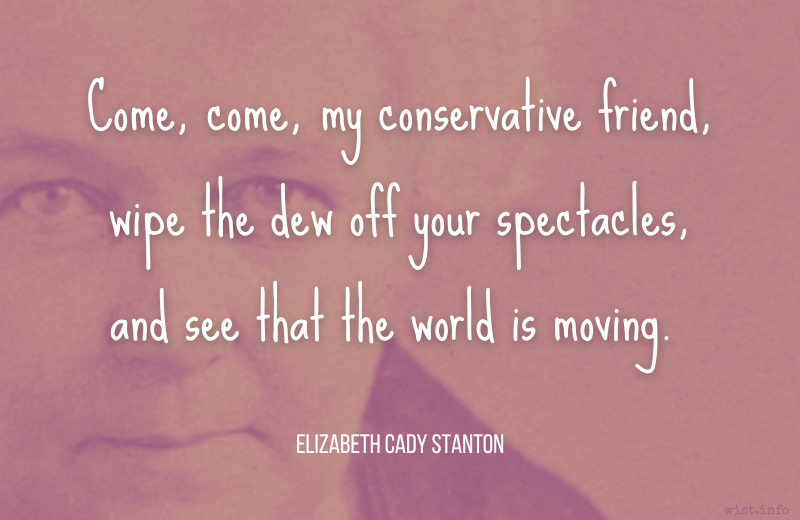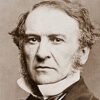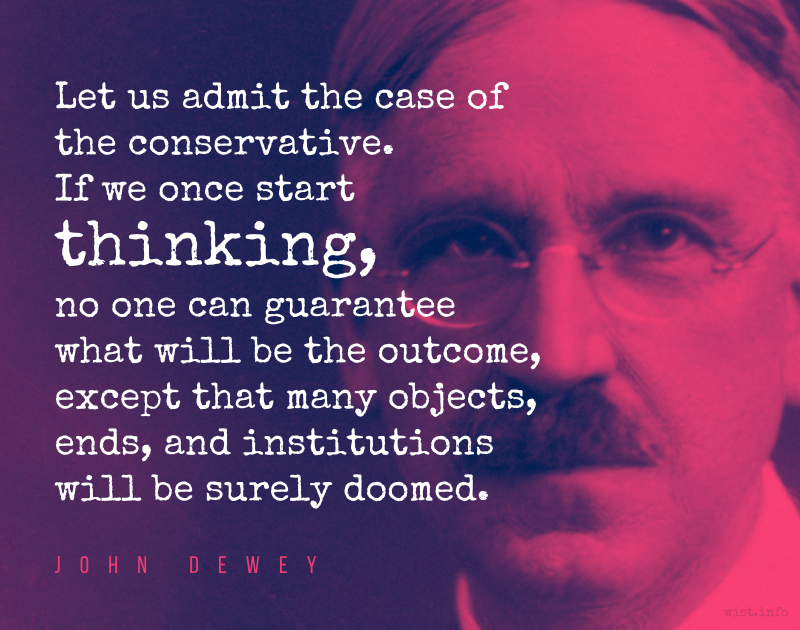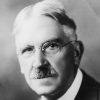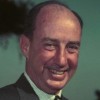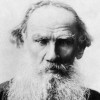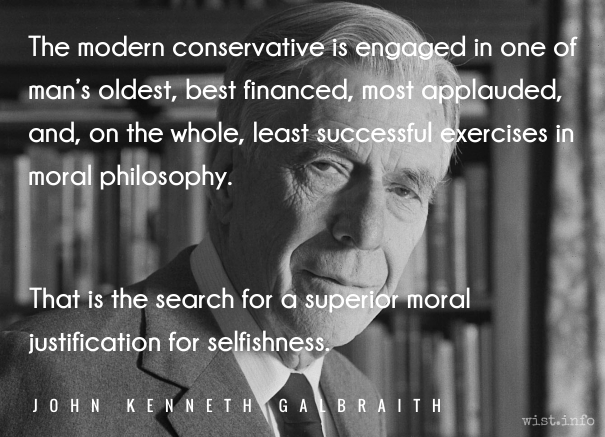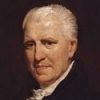Boy, these conservatives are really something, aren’t they? They’re all in favor of the Unborn. They will do anything for the Unborn. But once you’re born, you’re on your own. Pro-life conservatives are obsessed with the fetus from conception to nine months. After that, they don’t want to know about you. They don’t want to hear from you. No nothing. No neo-natal care. No daycare. No Head Start. No school lunch. No food stamps. No welfare. No nothing. If you’re pre-born you’re fine. If you’re pre-school, you’re fucked.
George Carlin (1937-2008) American comedian
Show (1996-03-29), Back in Town, “Abortion,” Beacon Theatre, New York City (HBO)
(Source)
(Source (Video), dialogue confirmed)
Quotations about:
conservative
Note not all quotations have been tagged, so Search may find additional quotes on this topic.
Now I know that in thus turning Conservative with years, I am going through the normal cycle of change and travelling in the common orbit of men’s opinions. I submit to this, as I would submit to gout or grey hair, as a concomitant of growing age or else of failing animal heat; but I do not acknowledge that it is necessarily a change for the better — I dare say it is deplorably for the worse.
The true friend of property, the true conservative, is he who insists that property shall be the servant and not the master of the commonwealth; who insists that the creature of man’s making shall be the servant and not the master of the man who made it. The citizens of the United States must effectively control the mighty commercial forces which they have called into being. There can be no effective control of corporations while their political activity remains. To put an end to it will be neither a short nor an easy task, but it can be done.
Theodore Roosevelt (1858-1919) American politician, statesman, conservationist, writer, US President (1901-1909)
Speech (1910-08-31), “The New Nationalism,” John Brown Memorial Park dedication, Osawatomie, Kansas
(Source)
Most revolutionaries are potential tories, because they imagine that everything can be put right by altering the shape of society; once that change is effected, as it sometimes is, they see no need for any other.
George Orwell (1903-1950) English journalist, essayist, writer [pseud. of Eric Arthur Blair]
Essay (1939), “Charles Dickens,” sec. 6, Inside the Whale (1940-03-11)
(Source)
Fear of change is, no doubt, in all of us, but it most afflicts the man who fears that any change must lead to loss of his wealth and status. When this fear becomes inordinate, he will, if he has political power, abrogate such things as civil rights and the rule of law, using the argument that he abrogates them only to preserve them. In my own country, the government, in order to preserve Christian civilization, uses methods incompatible with Christianity and abrogates values which are essential to any civilization which calls itself Christian. If only a man would say, “I do this because I’m afraid,” one could bear it; but when he says, “I do this because I’m good,” that is a bit too much.
What is Tradition? It’s the thing we laugh at the English for having, and we beat them practicing it.
Will Rogers (1879-1935) American humorist
Article (1928-05-26), “Letter of a Self-Made Diplomat to His President,” Saturday Evening Post
(Source)
Collected in More Letters of a Self-Made Diplomat to His President (1928) [ed. Steven Gragert].
Come, come, my conservative friend, wipe the dew off your spectacles, and see that the world is moving.
Elizabeth Cady Stanton (1815-1902) American social activist, abolitionist, woman's suffragist
The Woman’s Bible, Part 1, Introduction (1895)
(Source)
A Conservative is a man with two perfectly good legs who, however, has never learned to walk forward.
Franklin Delano Roosevelt (1882-1945) American lawyer, politician, statesman, US President (1933-1945)
Speech (1939-10-26), New York Herald Tribune Forum (radio broadcast)
(Source)
Why is it that right-wing bastards always stand shoulder to shoulder in solidarity, while liberals fall out among themselves?
Yevgeny Yevtushenko (1933-2017) Russian poet, writer, film director, academic [Евге́ний Евтуше́нко, Evgenij Evtušenko]
In The Observer (15 Dec 1991)
(Source)
A conservative is a man who has plenty of money and doesn’t see any reason why he shouldn’t always have plenty of money.
Will Rogers (1879-1935) American humorist
Column (1933-03-26), “Weekly Article: We’re Off to a Flying Start”
(Source)
Collected in Steven Grager, ed., Will Rogers' Weekly Articles, Vol. 6 "The Roosevelt Years, 1933-1935" (2011 ed.). Also reprinted in abbreviated format, in Donald Day, ed., The Autobiography of Will Rogers (1949).
The principle of Toryism is mistrust of the people, qualified by fear; the principle of Liberalism is trust in the people, qualified by prudence.
William Gladstone (1809-1898) English Liberal politician, Prime Minister (1868-74, 1880-85, 1886, 1892-94)
Inscription on bust, National Liberal Club, London
(Source)
This quotation, or versions of it, are certainly associated to Gladstone, but with enough variants to make concrete attribution difficult. Sometimes given with "Conservatism" substituted for "Toryism." Sometimes quoted in the opposite order. Some renditions use "tempered" rather than "qualified" for one or the other clause, e.g.,:Liberalism is trust of the people, tempered by prudence; Conservatism, distrust of the people, tempered by fear.The principle of Liberalism is trust in the people, qualified by prudence. The principle of Conservatism is mistrust of the people qualified by fear.One party is influenced by trust of the people tempered by prudence, the other by distrust of the people tempered by fear.
The phrase has been attributed to speeches given in Oxford and Chester and in disparate dates from 1866, to 1872, to 1877. It is altogether likely he used different variations at multiple times. Two uses where I could find decent citations:I think that the principle of the Conservative Party is jealousy of liberty and of the people, only qualified by fear; but I think the principle of the Liberal Party is trust in the people, only qualified by prudence.
[Speech, Opening of the Palmerston Club, Oxford (Dec 1878)][His policy of] trust in the people, tempered by prudence, and averse to violent and hasty change.
[Manifesto to the Electors of South-West Lancashire (1866)]
A conservative young man has wound up his life before it was unreeled. We expect old men to be conservative, but when a nation’s young men are conservatives, its funeral bell is already rung.
Henry Ward Beecher (1813-1887) American clergyman and orator
Life Thoughts (1858) [ed. Proctor]
(Source)
This was more succinctly summarized in Proverbs from Plymouth Pulpit, "Political" (1887) [ed. William Drysdale]:When a nation’s young men are conservatives, its funeral bell is already rung.
Conservatism consists of exactly one proposition, to wit:
There must be in-groups whom the law protects but does not bind, alongside out-groups whom the law binds but does not protect.
There is nothing more or else to it, and there never has been, in any place or time.
Frank Wilhoit (contemp.) American composer and software architect
Crookedtimber.org, “The Travesty of Liberalism,” Comment #26 (22 Mar 2018)
(Source)
Better be known as a Rampant Iconoclast than as a sonorous Echo.
Minna Antrim (1861-1950) American epigrammatist, writer
Don’ts for Bachelors and Old Maids (1908)
(Source)
At odd and unpredictable times, we cling in fright to the past.
Isaac Asimov (1920-1992) Russian-American author, polymath, biochemist
Foundation’s Edge, Part 1, ch. 1 (1982)
(Source)
The central conservative truth is that it is culture, not politics, that determines the success of a society. The central liberal truth is that politics can change a culture and save it from itself.
Conservatives know the world is a dark and forbidding place where most new knowledge is false, most improvements for the worse, the battle is not to the strong, nor riches to men of understanding, and an unscrupulous Providence consigns innocents to suffering.
George Will (b. 1941) American political commentator
“The Cubs and Conservatism” (21 Mar 1974), Bunts (1998)
(Source)
Will is, somewhat tongue-in-cheek, describing the origin of his conservatism in his being a fan of the Chicago Cubs baseball team.
The critic who at forty believes the same things he believed at twenty is either a genius or a jackass.
George Jean Nathan (1892-1958) American editor and critic
The World in Falseface, “Art & Criticism,” #62 (1923)
(Source)
Let us admit the case of the conservative. If we once start thinking, no one can guarantee what will be the outcome, except that many objects, ends, and institutions will be surely doomed. Every thinker puts some portion of an apparently stable world in peril, and no one can wholly predict what will emerge in its place.
John Dewey (1859-1952) American teacher and philosopher
Experience and Nature, ch. 6 “Nature, Mind and the Subject” (1929)
(Source)
Book form of the inaugural Paul Carus lectures, given by Dewey in 1925.
But the modern right wing, as Daniel Bell has put it, feels dispossessed: America has been largely taken away from them and their kind, though they are determined to try to repossess it and to prevent the final destructive act of subversion. The old American virtues have already been eaten away by cosmopolitans and intellectuals; the old competitive capitalism has been gradually undermined by socialistic and communistic schemers; the old national security and independence have been destroyed by treasonous plots, having as their most powerful agents not merely outsiders and foreigners as of old but major statesmen who are at the very centers of American power. Their predecessors had discovered conspiracies; the modern radical right finds conspiracy to be betrayal from on high.
Richard Hofstadter (1916-1970) American historian and intellectual
“The Paranoid Style in American Politics,” Herbert Spencer Lecture, Oxford (Nov 1963)
(Source)
Reprinted in Harpers (Nov 1964).
One need not go back two thousand years to the time when those who believed in the gospel of Jesus were thrown into the arena or hunted into dungeons to realize how little great beliefs or earnest believers are understood. The history of progress is written in the blood of men and women who have dared to espouse an unpopular cause, as, for instance, the black man’s right to his body, or woman’s right to her soul. If, then, from time immemorial, the New has met with opposition and condemnation, why should my beliefs be exempt from a crown of thorns?
Emma Goldman (1869-1940) Lithuanian-American anarchist, activist
“What I Believe,” New York World (19 Jul 1908)
(Source)
No one has ever been known to decline to serve on a committee to investigate radicals on the ground that so much exposure to their doctrines would weaken his patriotism, nor on a vice commission on the ground that it would impair his morals. Anything may happen inside the censor, but what counts is that in his outward appearances after his ordeal by temptation he is more than ever a paragon of the conforming virtues. Perhaps his appetites are satisfied by an inverted indulgence, but to a clear-sighted conservative that does not really matter. The conservative is not interested in innocent thoughts. He is interested in loyal behavior.
Walter Lippmann (1889-1974) American journalist and author
Men of Destiny, ch. 8 “The Nature of the Battle Over Censorship,” sec. 2 (1927)
(Source)
[The right wing] believe that their prestige in the community, even indeed their self-esteem, depends on having these values honored in public. Besides their economic expectations, people have deep emotional commitments in other spheres — religion, morals, culture, race relations — which they also hope to see realized in political action. Status politics seeks not to advance perceived material interests but to express grievances and resentments about such matters, to press claims upon society to give deference to non-economic values.
Douglas R. Hofstadter (b. 1945) American academic, cognitive scientist, author
“Pseudo-Conservatism Revisited — 1965,” sec. 4 (1965)
(Source)
He [the pseudo-conservative] sees his own country as being so weak that it is constantly about to fall victim to subversion; and yet he feels that it is so all-powerful that any failure it may experience in getting its own way in the world … cannot possibly be due to its limitations but must be attributed to its having been betrayed.
Richard Hofstadter (1916-1970) American historian and intellectual
“The Pseudo-Conservative Revolt” (1954)
(Source)
Nobody but radicals have ever accomplished anything in a great crisis. Conservatives have their place in the piping times of peace; but in emergencies only rugged issue men amount to much.
James A. Garfield (1831-1881) US President (1881), lawyer, lay preacher, educator
Diary (1876)
(Source)
Men are conservatives when they are least vigorous, or when they are most luxurious. They are conservatives, after dinner, or before taking their rest; when they are sick, or aged: in the morning, or when their intellect or their conscience have been aroused, when they hear music, or when they read poetry, they are radicals.
Ralph Waldo Emerson (1803-1882) American essayist, lecturer, poet
“New England Reformers,” lecture, Boston (1844-03-03), Essays: Second Series (1844)
(Source)
To anger a conservative, lie to him. To anger a liberal, tell him the truth.
Theodore Roosevelt (1858-1919) American politician, statesman, conservationist, writer, US President (1901-1909)
(Spurious)
Frequently attributed to Roosevelt but unsourced; first appears in the 2000s. See here for more discussion.
I am not sure what it means when one says that he is a conservative in fiscal affairs and a liberal in human affairs. I assume what it means is that you will strongly recommend the building of a great many schools to accommodate the needs of our children, but not provide the money.
When you say “radical right” today, I think of these moneymaking ventures by fellows like Pat Robertson and others who are trying to take the Republican Party away from the Republican Party, and make a religious organization out of it. If that ever happens, kiss politics goodbye.
Barry Goldwater (1909-1998) American politician
“Barry Goldwater’s Left Turn,” The Washington Post (28 Jul 1994)
(Source)
And I am even more angry as a legislator who must endure the threats of every religious group who thinks it has some God-granted right to control my vote on every roll call in the Senate. I am warning them today: I will fight them every step of the way if they try to dictate their moral convictions to all Americans in the name of “conservatism.”
Today’s so-called “conservatives” don’t even know what the word means. They think I’ve turned liberal because I believe a woman has a right to an abortion. That’s a decision that’s up to the pregnant woman, not up to the pope or some do-gooders or the Religious Right. It’s not a conservative issue at all.
In the manner of one who has just beheld a two-headed calf they repeated that they had “never heard such funny ideas!” They were staggered to learn that a real tangible person, living in Minnesota, and married to their own flesh-and-blood relation, could apparently believe that divorce may not always be immoral; that illegitimate children do not bear any special and guaranteed form of curse; that there are ethical authorities outside of the Hebrew Bible; that men have drunk wine yet not died in the gutter; that the capitalistic system of distribution and the Baptist wedding-ceremony were not known in the Garden of Eden; that mushrooms are as edible as corn-beef hash; that the word “dude” is no longer frequently used; that there are Ministers of the Gospel who accept evolution; that some persons of apparent intelligence and business ability do not always vote the Republican ticket straight; that it is not a universal custom to wear scratchy flannels next the skin in winter; that a violin is not inherently more immoral than a chapel organ; that some poets do not have long hair; and that Jews are not always pedlers or pants-makers.
“Where does she get all them the’ries?” marveled Uncle Whittier Small; while Aunt Bessie inquired, “Do you suppose there’s many folks got notions like hers? My! If there are,” and her tone settled the fact that there were not, “I just don’t know what the world’s coming to!”
I have tried to make it clear that it is wrong to use immoral means to attain moral ends. But now I must affirm that it is just as wrong, or even more so, to use moral means to preserve immoral ends.
Martin Luther King, Jr. (1929-1968) American clergyman, civil rights leader, social activist, preacher
Letter from Birmingham Jail (16 Apr 1963)
(Source)
Slavery was contrary to all the moral principles advocated by Plato and Aristotle, yet neither of them saw this because to renounce slavery would have meant the collapse of the life they were living.
Religion that seeks to be no more than a time capsule is likely to be claustrophobic.
Abdal Hakim Murad (b. 1960) British Muslim shaykh, researcher, writer, academic [b. Timothy John Winter]
“Contentions 2,” # 8
(Source)
America — a conservative country without any conservative ideology — appears now before the world a naked and arbitrary power, as, in the name of realism, its men of decision enforce their often crackpot definitions upon world reality. The second-rate mind is in command of the ponderously spoken platitude. In the liberal rhetoric, vagueness, and in the conservative mood, irrationality, are raised to principle. Public relations and the official secret, the trivializing campaign and the terrible fact clumsily accomplished, are replacing the reasoned debate of political ideas in the privately incorporated economy, the military ascendancy, and the political vacuum of modern America.
C. Wright Mills (1916-1962) American sociologist, academic, author [Charles Wright Mills]
The Power Elite, ch. 14 “The Conservative Mood” (1956)
(Source)
They lied to you. The Devil is not the Prince of Matter; the Devil is the arrogance of the spirit, faith without smile, truth that is never seized by doubt. The Devil is grim because he knows where he is going, and, in moving, he always returns whence he came.
People who insist that the sacredness of Scripture depends on belief in creation in a literal six days seem never to insist on a literal reading of “to him who asks, give,” or “sell what you have and give the money to the poor.” In fact, their politics and economics align themselves quite precisely with those of their adversaries, who yearn to disburden themselves of the weak, and to unshackle the great creative forces of competition. The defenders of “religion” have made religion seem foolish while rendering it mute in the face of a prolonged and highly effective assault on the poor.
Old people have faults of their own; they tend to become cowardly, niggardly, and suspicious. Whether from the growth of experience or the decline of animal heat, I see that age leads to these and certain other faults; and it follows, of course, that while in one sense I hope I am journeying towards the truth, in another I am indubitably posting towards these forms and sources of error.
When you are right you cannot be too radical; when you are wrong, you cannot be too conservative.
Martin Luther King, Jr. (1929-1968) American clergyman, civil rights leader, social activist, preacher
(Misttributed)
(Source)
Often attributed directly to King, he prefaced it, in Why We Can't Wait (1964), with "Someone once wrote ..."
If you’re not a liberal when you’re 25, you have no heart. If you’re not a conservative by the time you’re 35, you have no brain.
Winston Churchill (1874-1965) British statesman and author
(Spurious)
This hasn't been found in Churchill's writings, and is generally believed by researchers (and the Churchill Centre) to be spurious. It's also misaligned with the ideological cycle of Churchill's own career.
See Clemenceau for more discussion about this general quotation form.
The modern conservative is not even especially modern. He is engaged, on the contrary, in one of man’s oldest, best financed, most applauded, and, on the whole, least successful exercises in moral philosophy. That is the search for a superior moral justification for selfishness. It is an exercise which always involves a certain number of internal contradictions and even a few absurdities. The conspicuously wealthy turn up urging the character-building value of privation for the poor. The man who has struck it rich in minerals, oil, or other bounties of nature is found explaining the debilitating effect of unearned income from the state. The corporate executive who is a superlative success as an organization man weighs in on the evils of bureaucracy. Federal aid to education is feared by those who live in suburbs that could easily forgo this danger, and by people whose children are in public schools. Socialized medicine is condemned by men emerging from Walter Reed Hospital. Social Security is viewed with alarm by those who have the comfortable cushion of an inherited income. Those who are immediately threatened by public efforts to meet their needs — whether widows, small farmers, hospitalized veterans, or the unemployed — are almost always oblivious to the danger.
John Kenneth Galbraith (1908-2006) Canadian-American economist, diplomat, author
Speech (1963-12-13), “Wealth and Poverty,” National Policy Committee on Pockets of Poverty
(Source)
Galbraith used variations on this quote over the years.
- The above quotation was from a speech given, that was then entered into the Congressional Record, Vol. 109, Senate (1963-12-18).
- This material was reworked into an article "Let us begin: An invitation to action on poverty," in Harper's (1964-03), which was in turn again entered into the Congressional Record, Vol. 110 (1964).
- One of the last is most often cited: "The modern conservative is engaged in one of man’s oldest exercises in moral philosophy, that is the search for a superior moral justification for selfishness. It is an exercise which always involves a certain number of internal contradictions and even a few absurdities. The conspicuously wealthy turn up urging the character-building value of privation for the poor." ["Stop the Madness," Interview with Rupert Cornwell, Toronto Globe and Mail (2002-07-06)]
I am old, but I certainly have not that sign of old-age, extolling the past at the expense of the present.
Sydney Smith (1771-1845) English clergyman, essayist, wit
Memoir of the Reverend Sydney Smith, by His Daughter, Lady Holland, Vol. 1, ch. 11 (1855)
(Source)
All men are by nature conservative but conservatism in the military profession is a source of danger to the country. One must be ready to change his line sharply and suddenly, with no concern for the prejudices and memories of what was yesterday. To rest upon formula is a slumber that, prolonged, means death.
Hyman Rickover (1900-1986) American naval engineer, submariner, US Navy Admiral
Speech (1954-03-16), “Administering a Large Military Development Project,” US Naval Postgraduate School, Monterey, California
(Source)
RADICALISM, n. The conservatism of to-morrow injected into the affairs of to-day.
Ambrose Bierce (1842-1914?) American writer and journalist
“Radicalism,” The Devil’s Dictionary (1911)
(Source)
Originally published in the "Cynic's Word Book" column in the New York American (1906-06-29).
It is well known that the most radical revolutionary will become a conservative the day after the revolution.
Hannah Arendt (1906-1975) German-American philosopher, political theorist
Essay (1970-09-12), “Civil Disobedience,” The New Yorker
(Source)
Revised and collected in Crises of the Republic (1972).
Law and order is like patriotism — anyone who comes on strong about patriotism has got something to hide — it never fails. They always turn out to be a crook or an asshole or a traitor or something.
Bill Mauldin (1921-2003) American editorial cartoonist, writer
Interview by Donald R. Katz, “Bill Mauldin: Drawing Fire,” Rolling Stone (4 Nov 1976)
(Source)
I did not mean that Conservatives are generally stupid; I meant, that stupid persons are generally Conservative. I believe that to be so obvious and undeniable a fact that I hardly think any honorable Gentleman will question it.
John Stuart Mill (1806-1873) English philosopher and economist
Debate in Parliament with John Pakington (31 May 1866)
Often paraphrased "Although it is not true that all conservatives are stupid people, it is true that most stupid people are conservative."Misquoted in Courtney, Life of John Stuart Mill (1889) as "I never meant to say that the Conservatives are generally stupid. I meant to say that stupid people are generally Conservative. I believe that is so obviously and universally admitted a principle that I hardly think any gentleman will deny it."







